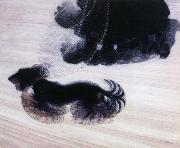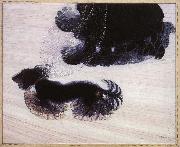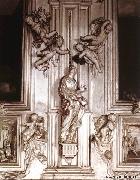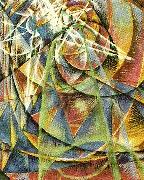All giacomo balla Oil PaintingsBalla is often portrayed as a painter closely associated with Italian Futurism although in fact, like a number of others associated with the group, his work crossed into a number of creative disciplines including fashion and the applied arts. In 1914 he wrote the Manifesto on Menswear, later retitled Antineutral Clothing, a dramatic exhortation to dispense with the mundaneity of everyday menswear in favour of dynamic, expressive, and aggressive Futurist clothing. Like his fellow Futurists he sought to sweep away all vestiges of Italy cultural heritage in favour of an emphatically 20th-century way of life. He conceived of Futurist menswear as allowing its wearers to respond to mood changes through pneumatic devices that can be used on the spur of the moment, thus everyone can alter his dress according to the needs of his spirit. It could also be animated by electric bulbs. He had an exhibition at the Casa DArte Bragaglia in Rome in 1918, in conjunction with which he co-published his Colour Manifesto. He was also committed to Futurist applied arts and furniture, brightly painted and with richly animated surfaces, and showed them at his Futurist House in 1920, the year in which he collaborated on the journal Roma futurista. He also exhibited at the Paris Exposition des Arts D??coratifs et Industriels of 1925 and the International Exhibition at Barcelona in 1929. However he failed to get his Futurist designs put into mass production and during the 1930s gradually distanced himself from such an outlook. |
|||
 |
|||
|
|
|
||||||||||
|
|
||||||||||
|
dynamism of a dog on a leash Gemälde IDENTIFIZIERUNG:: 56464 |
dynamism of a dog on a leash mk247 1912,oil on canvas,35.375x43.25 in,90x110 cm,albright knox art gallery,buffalo,ny,usa mk247 1912,oil on canvas,35.375x43.25 in,90x110 cm,albright knox art gallery,buffalo,ny,usa |
|||||||||
|
|
||||||||||
|
|
With a chain holding the dog s dynamic Gemälde IDENTIFIZIERUNG:: 56997 |
With a chain holding the dog s dynamic mk250 Year in 1912. Oil on canvas 89.9 x 109.9 cm. New York at Buffalo. Albright - Knox Art Gallery. mk250 Year in 1912. Oil on canvas 89.9 x 109.9 cm. New York at Buffalo. Albright - Knox Art Gallery. |
||||||||
|
|
||||||||||
|
|
Humility Gemälde IDENTIFIZIERUNG:: 63040 |
Humility 1710-17 White stucco Oratorio del Rosario di San Domenico, Palermo In the last years of the 17th century the Sicilian sculptor Giacomo Serpotta was commissioned to decorate the Oratory of San Lorenzo. He illustrated the lives of saints Francesco and Lorenzo in high-relief scenes, accompanying these with appropriate allegorical figures in the round. With the scenes of San Lorenzo is one of the artist's most graceful works, the figure of Humility, represented as a young woman with fluttering draperies, surrounded by four groups of flying putti. Executed, as are the reliefs, entirely in stucco - a material that demands speed in working and allows no vacillation - the group shows the artist's great virtuosity. Artist: SERPOTTA, Giacomo Painting Title: Humility , 1651-1700 Painting Style: Italian , sculpture Type: mythological 1710-17 White stucco Oratorio del Rosario di San Domenico, Palermo In the last years of the 17th century the Sicilian sculptor Giacomo Serpotta was commissioned to decorate the Oratory of San Lorenzo. He illustrated the lives of saints Francesco and Lorenzo in high-relief scenes, accompanying these with appropriate allegorical figures in the round. With the scenes of San Lorenzo is one of the artist's most graceful works, the figure of Humility, represented as a young woman with fluttering draperies, surrounded by four groups of flying putti. Executed, as are the reliefs, entirely in stucco - a material that demands speed in working and allows no vacillation - the group shows the artist's great virtuosity. Artist: SERPOTTA, Giacomo Painting Title: Humility , 1651-1700 Painting Style: Italian , sculpture Type: mythological |
||||||||
|
|
||||||||||
|
|
merkurius passerar framfor solen Gemälde IDENTIFIZIERUNG:: 67742 |
merkurius passerar framfor solen 1916 se 1916 se |
||||||||
|
|
||||||||||
| VORHERIGER KÜNSTLER NÄCHSTER KÜNSTLER | ||||||||||
|
|
||||||||||
| giacomo balla | ||||||||||
| Balla is often portrayed as a painter closely associated with Italian Futurism although in fact, like a number of others associated with the group, his work crossed into a number of creative disciplines including fashion and the applied arts. In 1914 he wrote the Manifesto on Menswear, later retitled Antineutral Clothing, a dramatic exhortation to dispense with the mundaneity of everyday menswear in favour of dynamic, expressive, and aggressive Futurist clothing. Like his fellow Futurists he sought to sweep away all vestiges of Italy cultural heritage in favour of an emphatically 20th-century way of life. He conceived of Futurist menswear as allowing its wearers to respond to mood changes through pneumatic devices that can be used on the spur of the moment, thus everyone can alter his dress according to the needs of his spirit. It could also be animated by electric bulbs. He had an exhibition at the Casa DArte Bragaglia in Rome in 1918, in conjunction with which he co-published his Colour Manifesto. He was also committed to Futurist applied arts and furniture, brightly painted and with richly animated surfaces, and showed them at his Futurist House in 1920, the year in which he collaborated on the journal Roma futurista. He also exhibited at the Paris Exposition des Arts D??coratifs et Industriels of 1925 and the International Exhibition at Barcelona in 1929. However he failed to get his Futurist designs put into mass production and during the 1930s gradually distanced himself from such an outlook. | ||||||||||
|
|
||||||||||
|
KONTAKTIEREN Sie UNS |









